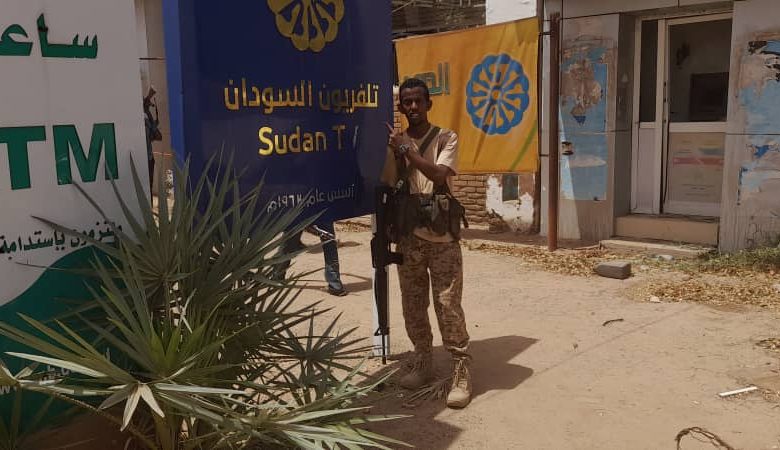After being Liberated from the Rebellion.. Sudanese Radio.. New Decisions

Sudan Events: Magda Hassan
Many artistic and political figures came to visit to the Sudanese Radio building after its liberation from the grip of the rebellion, which had been imprisoned there for the past 11 months.
The soldiers stationed in the building of the World Radio and Television Corporation received a delegation led by the singer Dr. Abdul Qader Salem and the poet Al-Tijani Haj Musa, sharing the joy of victory with the soldiers, and the singer Abdul Qader Salem singing the song (For you, my homeland is the home of my beloved ones. I work, build, and protect my soil).
Al-Tijani Haj Musa then recited poems that the soldiers repeated with him. Al-Tijani said at the end of the visit:
Sudan is fine and will pass this divine test, Allah willing: It is a severe trial that has only happened in our country, but what is coming is more beautiful and tomorrow the war will stop and bleeding will stop with it.
The archive is fine
After the liberation of the radio, a number of decisions and directives were issued regarding it, the first of which was the necessity of forming a committee to inventory the damage and the resulting destruction and tampering with the nation’s memory.
Photos circulated after the entry of the radio showed the tapes being scattered on the ground and some of them being damaged.
However, Adel Al-Baz, editor-in-chief of Sudan Events newspaper, affirmed that, There is no fear for the radio archive at all; Even if it was completely destroyed along with the radio buildings… He said that during his membership in the Board of Directors of Radio and Television, he witnessed the efforts of Dr. Amin Hassan Omar and Awad Jadin, during their administrative period at the Authority, digitized the entire radio archive; In addition to what was broadcast after that.
Al-Baz explained that among the conditions that were set were: It was accepted by the German Company for Digitization and Archiving and implemented.
It is for the company to keep a copy of the entire archive abroad., and it was.
Technology appointment
The latest decisions regarding radio, which were made yesterday, Mustafa Jaber Takroni was appointed Director General of the National Radio and TV Authority.
The decision came in the wake of the decision of the state’s supreme leadership to terminate the services of contract managers who had contracted for a pension and were working contractually. The decision also prohibited any new contract with any pension in the state.
To assume any executive position, all states were directed through the Federal Government Office to enforce the decision to exempt contracted pensioners.
Features of the media
In this context, the Governor of Khartoum and the Minister of Information determined the features of the media in the coming phase coinciding with the liberation of the radio and television buildings and the surrounding neighborhoods. The Minister of Culture and Information, Graham Abdel Qader, accompanied by the former Director General of the General Authority for Radio and Television, Ibrahim Al-Buzaei , arrived from the city of Port Sudan.
The delegation held a meeting with the Governor of Khartoum, Ahmed Osman Hamza, in the presence of representatives of the national media agencies and Khartoum State media figures.
Defeating the conscience of rebellion.
Minister of Culture and Information, Graham Abdel Qader, said that radio is one of the basic treasures of the nation, and the defeat of support on the radio is a defeat for the conscience of the rebellion, and that the purpose of their visit is to congratulate the armed forces, other regular forces, the governor of Khartoum, and the citizens on the victories achieved by the dignity Battle, which has reached an important stage.
Qualifying the media
The Governor of Khartoum stressed that the coming phase requires coordination at a high level for media management, awareness and awareness of the concept of national security, and defining the tasks and duties of the media in accordance with the state’s approach to war.
The necessity of unifying the media discourse and media directives that are based on the Sudanese identity and strengthening the role of the armed forces in achieving unity and national sovereignty away from regionalism and tribalism. He pointed out that the next stage is no less important than the war phase , as it is the stage of building, rebuilding and rehabilitating the national and state media.



